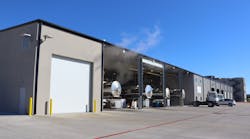Longwei Petroleum Investment Holding Ltd, an energy company engaged in storage and distribution of finished petroleum products in the People’s Republic of China, announced annual contracts with two new customers for its Gujiao petroleum storage facility representing sales of 19,000 metric tons of petroleum products. The company estimates that the contracts will be worth approximately $20.1 million based on current pricing levels.
In order to meet China’s energy-saving targets for its 11th Five-Year Plan (2006-2010), some municipal governments are cutting off electricity supplies to reduce emissions. Electricity rationing measures have caused a surge in demand for electrical power from diesel generators, creating a widespread shortage of diesel fuel. Some experts, including Dr Lin Boqiang, director of the China Center for Energy Economics Research at Xiamen University, do not expect the shortage to improve before the end of 2010, as many businesses are still using diesel to generate power for their operations, and say that power-cutting policies by local governments must be retracted in order for the situation to be resolved.
“We have an opportunity to capitalize on our 16-year relationships with our refinery partners to ensure consistent supply for our customers,” said Michael Toups, chief financial officer of Longwei. “We currently maintain an approximately 30-day supply of inventory on hand and have supplier advance balances with our refinery partners that represent an additional 60-day supply. This allows us to ensure consistent supply and react quickly to purchase product based on the timing of PRC pricing level adjustments.”
Under the 2009 pricing mechanism established by the National Development and Reform Commission (NDRC), China’s economic policy planner, domestic refined oil prices are adjusted when the moving average of a basket of international crude (Brent, Dubai, and Cinta) changes more than 4% over a period of 22 working days.








